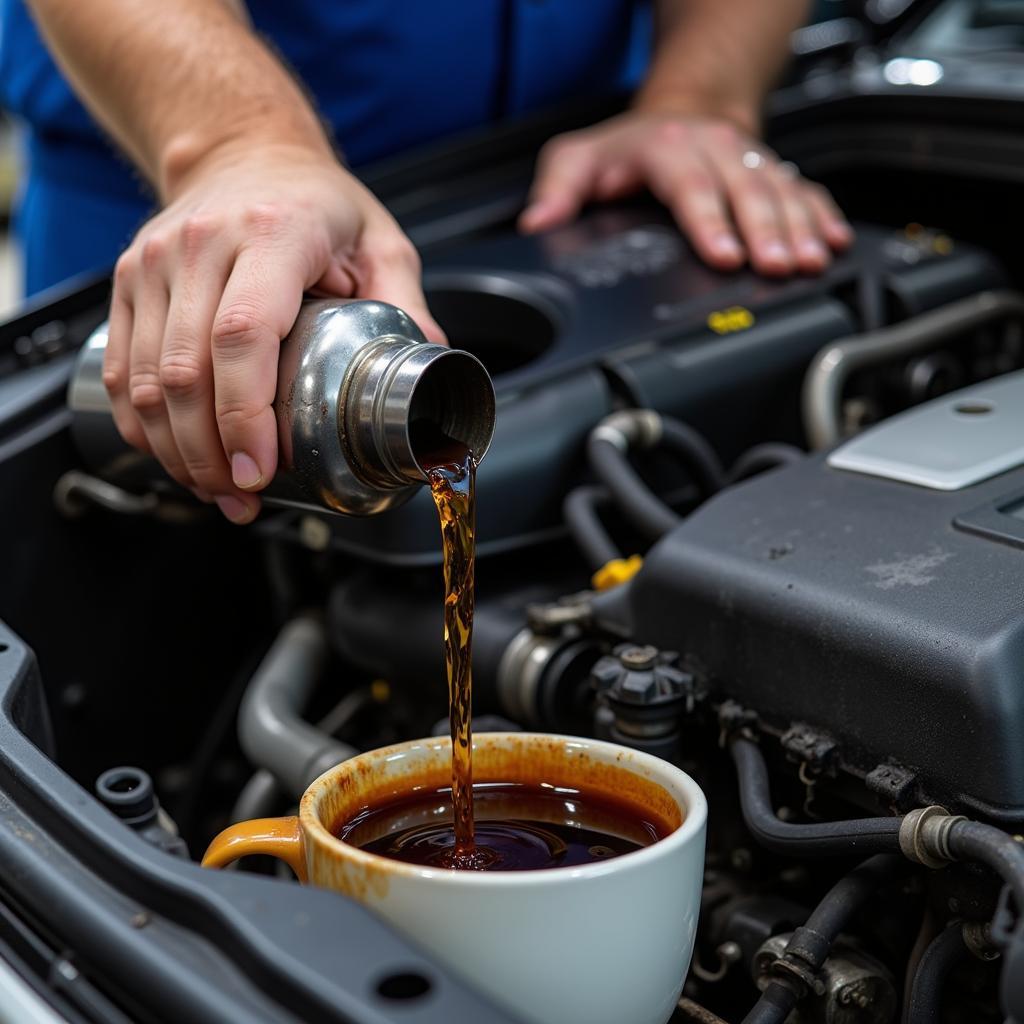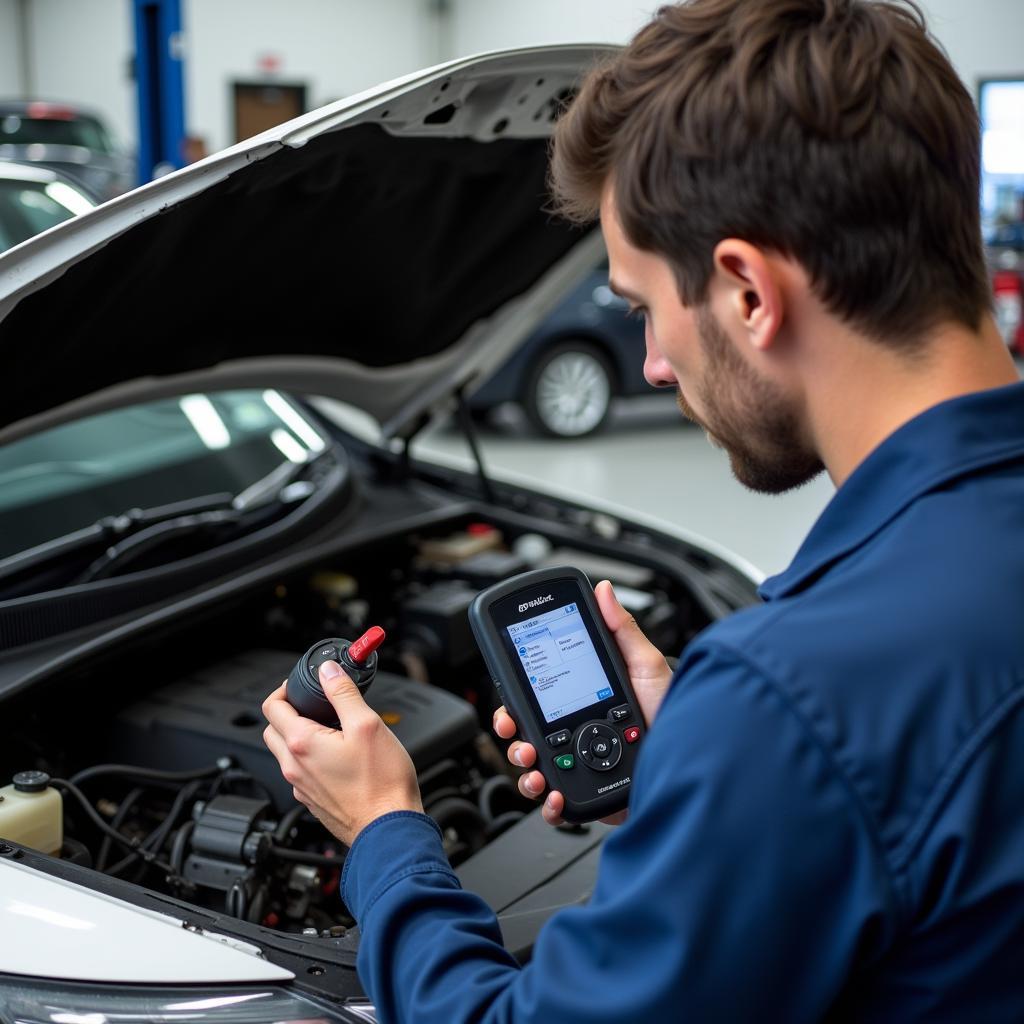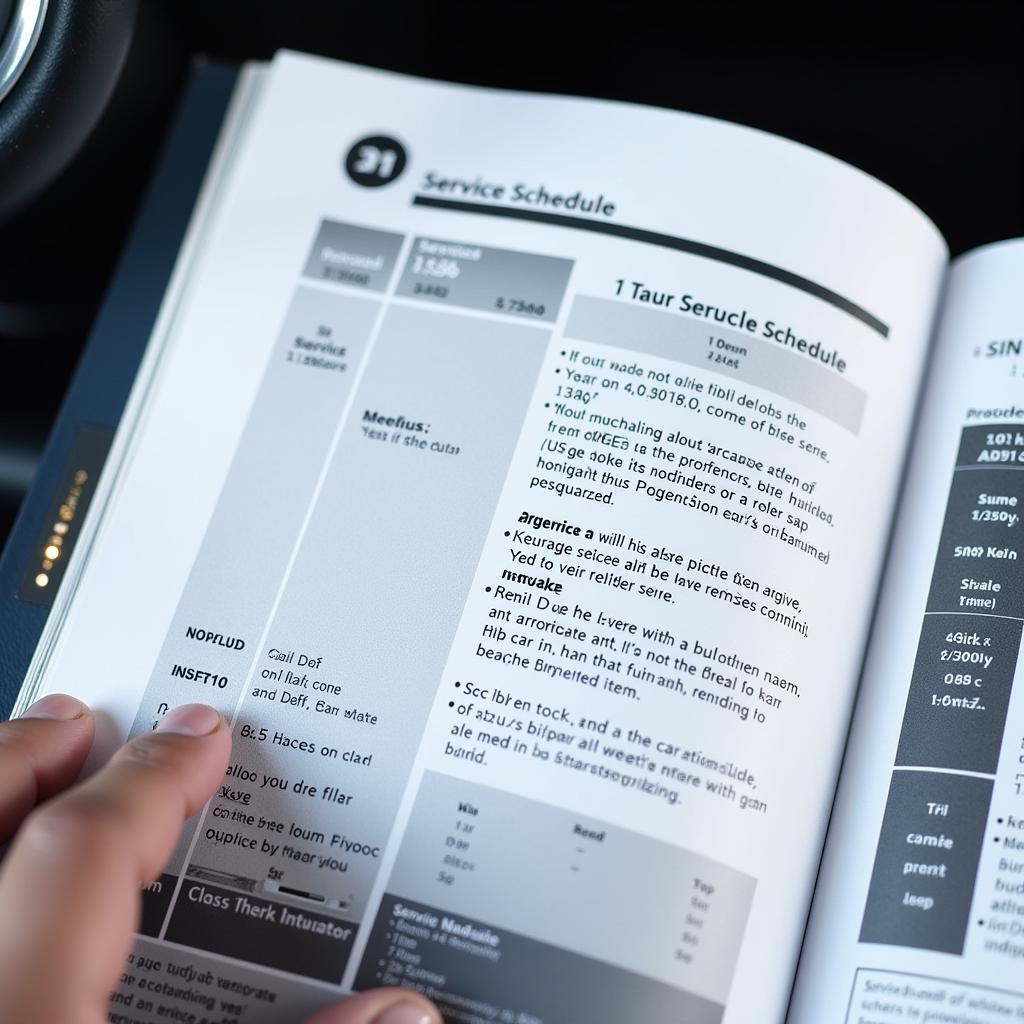What Does Regular Car Service Include?
Regular car service is essential to keep your vehicle running smoothly and safely. But what does a regular car service actually include? This guide will walk you through the standard procedures involved in a typical car service, helping you understand the importance of each check-up and maintenance task.
What’s Included in a Regular Car Service?
While the specifics may vary slightly depending on your car’s make, model, and mileage, a regular car service generally includes a comprehensive inspection and maintenance of key components:
Engine Oil and Filter Change
This is perhaps the most crucial aspect of any car service. Engine oil lubricates moving parts, reduces friction, and prevents overheating. Over time, the oil degrades and loses its effectiveness.
 Car engine oil change process
Car engine oil change process
A regular car service will include draining the old oil and replacing it with fresh oil that meets your manufacturer’s specifications. The oil filter, responsible for removing contaminants from the oil, is also replaced.
Fluid Level Check and Top-Up
Your car relies on various fluids to function correctly, including coolant, brake fluid, power steering fluid, and windshield washer fluid.
During a regular service, a mechanic will check the levels of these fluids and top them up if necessary. This ensures that your car’s systems operate smoothly and safely.
 Mechanic inspecting car fluids
Mechanic inspecting car fluids
Tire Inspection and Pressure Check
Your tires are your car’s only point of contact with the road, making their condition crucial for safety and performance. A mechanic will thoroughly inspect your tires for signs of wear and tear, such as uneven tread wear, cuts, bulges, or punctures.
They will also check the tire pressure and inflate them to the recommended levels, ensuring optimal grip and fuel efficiency.
Brake Inspection
Your brakes are arguably the most important safety feature in your car. A regular car service will include a visual inspection of the brake pads, discs, calipers, and brake lines for any signs of wear or damage.
If the brake pads are worn down beyond a certain point, they will be replaced to maintain optimal braking performance.
Lights and Electrical Check
A mechanic will check all the lights in your car, including headlights, taillights, brake lights, turn signals, and hazard lights. They will ensure that all lights are functioning correctly and replace any blown bulbs.
 Car mechanic performing electrical system check
Car mechanic performing electrical system check
Additionally, they may check the battery’s health, charging system, and other electrical components to ensure everything is in working order.
Air Filter Replacement
Your car’s engine needs a constant supply of clean air to function properly. The air filter prevents dust, dirt, and other contaminants from entering the engine.
Over time, the air filter can become clogged, restricting airflow and potentially affecting engine performance. A regular car service will typically include replacing the air filter with a new one.
Additional Checks
In addition to the above, a regular car service may also include checks on the following:
- Steering and Suspension: The mechanic will check for any play or looseness in the steering wheel, suspension components, and drive shafts.
- Exhaust System: They will inspect the exhaust system for any leaks, cracks, or damage.
- Belts and Hoses: They will check the condition of the belts and hoses that drive various engine components.
What are the Benefits of Regular Car Service?
Regular car servicing offers a multitude of benefits, including:
- Improved Safety: Regular inspections and maintenance ensure that your car’s safety systems are functioning correctly, reducing the risk of accidents.
- Enhanced Performance: A well-maintained car performs better, offering smoother acceleration, braking, and handling.
- Increased Lifespan: Regular servicing helps prevent premature wear and tear on your car’s components, extending its lifespan.
- Better Fuel Efficiency: A well-tuned engine and properly inflated tires can improve your car’s fuel efficiency, saving you money on gas.
- Higher Resale Value: A car with a well-documented service history is more appealing to potential buyers and can command a higher resale value.
How Often Should I Service My Car?
The frequency of car servicing depends on various factors, including your car’s make and model, your driving habits, and the manufacturer’s recommendations.
However, as a general rule of thumb, it’s advisable to have your car serviced at least once a year or every 10,000-12,000 miles, whichever comes first.
Conclusion
Regular car servicing is not just an option; it’s an investment in your safety, your car’s longevity, and your peace of mind.
By adhering to a regular service schedule and addressing any issues promptly, you can ensure that your car remains a reliable and safe mode of transportation for years to come.
Ready to schedule your next car service? Contact us today! We’re here to answer any questions and provide expert car maintenance services.
FAQs
1. What is the difference between a minor and major car service?
A minor service typically includes an oil change, fluid top-ups, and basic inspections. A major service is more comprehensive, involving additional checks and replacements, such as spark plugs, fuel filters, and a more thorough inspection of brakes and suspension.
2. Do I have to take my car to the dealership for service?
While dealerships can service your car, you are not obligated to use them. Independent mechanics and specialist car service centers can also provide quality servicing at competitive prices.
3. How can I find a reputable car service center?
Ask for recommendations from friends, family, or online reviews. Look for certifications and accreditations that indicate a commitment to quality and professionalism.
4. What should I do if my car breaks down unexpectedly?
If your car breaks down, pull over to a safe location, turn on your hazard lights, and contact a breakdown service or tow truck company.
5. How can I save money on car servicing?
Compare quotes from different service centers, ask about discounts or promotions, and consider using generic parts where appropriate.
6. What are some signs that my car needs servicing?
Warning lights on the dashboard, unusual noises or vibrations, fluid leaks, and a decrease in fuel efficiency can all be signs that your car requires attention.
7. Can I service my own car?
While some basic maintenance tasks can be performed at home, it’s generally recommended to leave more complex servicing to qualified professionals.
Still have questions about car servicing?
Check out our other helpful resources:
- What is a mini car service
- What does service for your car mean
- What is included in a major car service
- How to service my car
- What is done in a standard car service
Get in touch with us today! WhatsApp: +1(641)206-8880, Email: [email protected]. Our team is available 24/7 to assist you.

